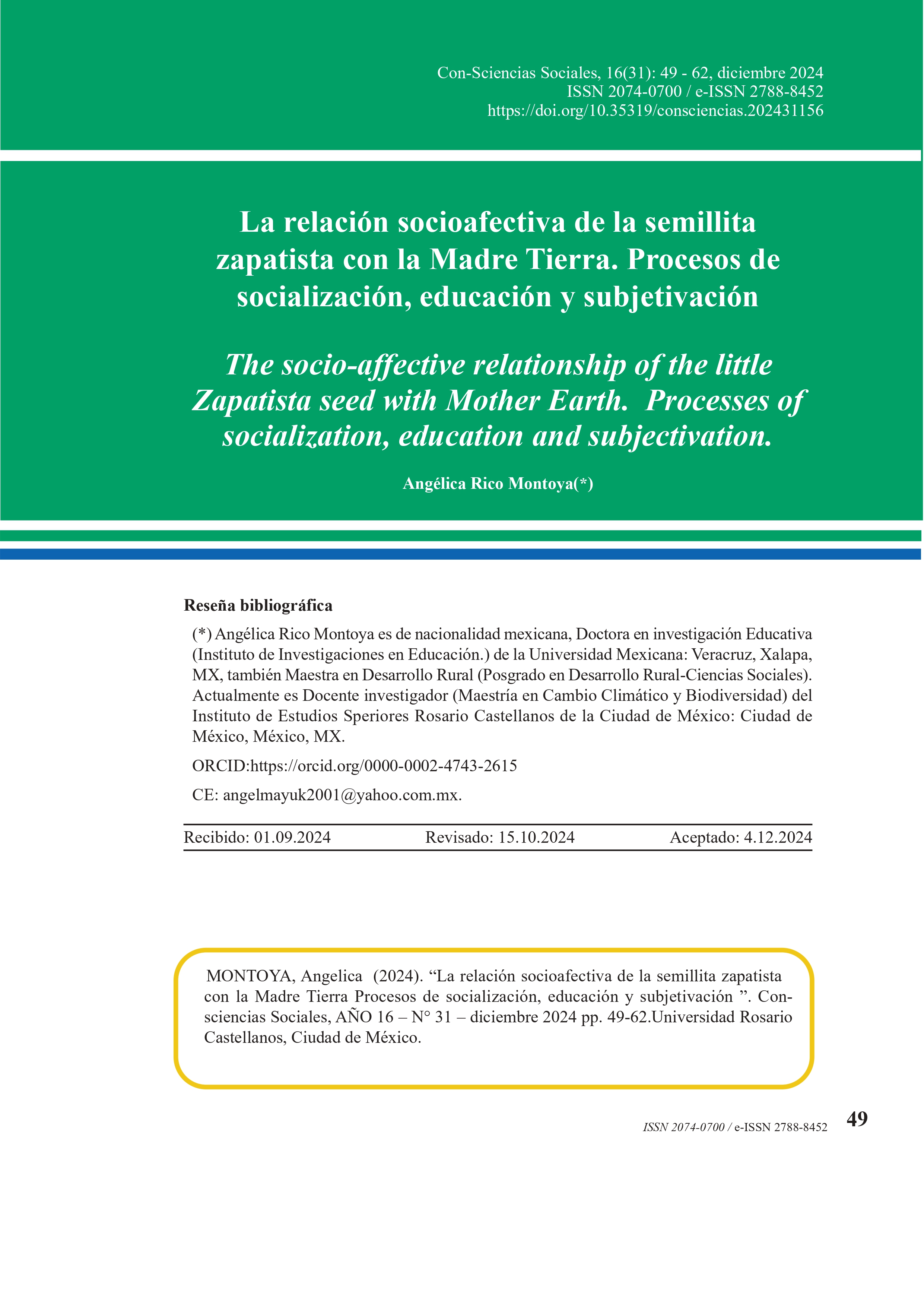The socio-affective relationship of the little Zapatista seed with Mother Earth. Processes of socialization, education and subjectivation
DOI:
https://doi.org/10.35319/consciencias.202431156Keywords:
Childhoods, Violence, Resistance, Subjectivity, Indigenous educationAbstract
Understanding the global context in which political violence against the movement occurs has allowed Zapatista mothers, fathers, grandparents and promoters to design a series of political, social, cultural and educational resistance strategies for children, as well as autonomous projects and spaces of re-existence that strengthen resilient and rebellious subjectivities from a very early age, vindicating the indigenous worldview and their socio-affective relationship with Mother Earth. Through collaborative ethnographic work with jungle families, drawings-interviews and participant observation of daily life and children's spaces, we reflect with the children and their caregivers on the war and the rebel-resistance socialized and reconfigured from the first childhood, as well as the intricate web of relationships that goes from the public to the private space, placing emphasis on collective identity and memory.
Downloads
References
Corona, Y., Núñez, K. y Rico, A. (2018) The right of the Ch´ol children of Chiapas to live in peace in their territories. Canadian Journal of Children’s Rights (32-49). https://www.researchgate.net/publication/337411587_The_right_of_the_Chol_children_of_Chiapas_to_live_in_peace_in_their_territories
De León, L. (2005) La llegada del alma. Lenguaje, infancia y socialización entre los mayas de Zinacantán. CIESAS-CONACULTA.
Fanon, F. (1963/2001) Los condenados de la tierra. Ciudad de México: Fondo de Cultura Económica.
Lenkersdorf, C. (2002) Filosofar en clave tojolabal. Ciudad de México: Porrúa.
Núñez Patiño, K. (2011) De la casa a la escuela zapatista. Prácticas de aprendizaje en la región ch’ol. En: Baronnet, B., Mora M. y Stahler-Sholk, R. (Coords.). Luchas ‘muy otras’. Zapatismo y autonomía en las comunidades indígenas de Chiapas. UAM- Xochimilco, CIESAS, UNACH, Ciudad de México, pp. 267-294.
Paoli, A. (2003) Educación, autonomía y Lekil Kuxlejal. Aproximación sociolingüística a la sabiduría de los tseltales. Ciudad de México: UAM-X, Comité de Derechos Humanos Fray Pedro Lorenzo de la Nada.
Pérez, S., Santiago, C., y Álvarez R. (2002) Ahora apuestan al cansancio. Chiapas: fundamentos psicológicos de una guerra contemporánea. Centro de Derechos Humanos Miguel Agustín ProJuárez-Grupo de Acción Comunitaria.
Rico A. (2007) Niños tseltales en territorio: resistencia, autonomía y guerra de baja Intensidad. [Tesis de Maestría]. UAM-Xochimilco.
Rico, A. (2018a) Infancias y maternidades zapatistas: subjetividades políticas emergentes en las prácticas educativas y de resistencia-rebelde frente a la contrainsurgencia en Chiapas. [Tesis Doctoral]. Universidad Veracruzana, Xalapa.
Rico, A. (2018b) De la colonización al proyecto de emancipación y educación zapatista. Relatos de infancia: racismo, violencia y memoria colectiva. Ra Ximhai Ciencias Sociales 14(2), pp. 63-86. DOI: https://doi.org/10.35197/rx.14.02.2018.04.ar
Rico, A. (2021a) En defensa de la madre tierra: la resistencia rebelde de los niños zapatistas en Chiapas. En: Derr, V., y Corona, Y., coords., Latin American Transnational Children and Youth. Experiences of nature and place, culture and care across the Americas, pp. 148-160. Londres: Routledge.
Rico, A. (2021b) Ser zapatista a los 4 años. Socialización y subjetividad de los niños tseltales. Líneas Críticas, 27, e36961. https://doi.org/10.26512/lc27202136961 DOI: https://doi.org/10.26512/lc27202136961
Villamil, R. y Manero, R. (2003) Infancia y terror en la vida cotidiana. Tramas, subjetividad y procesos sociales, 20. Ciudad de México: UAM Xochimilco, pp. 221-248.
Walsh, C. (2007) Interculturalidad y (de) colonialidad: diferencia y nación de otro modo. Pretextos educativos. Revista Boliviana de Educación, 7, pp. 81-89.

Published
How to Cite
Issue
Section
License
Copyright (c) 2024 Revista Con-Sciencias Sociales

This work is licensed under a Creative Commons Attribution-NonCommercial 4.0 International License.









